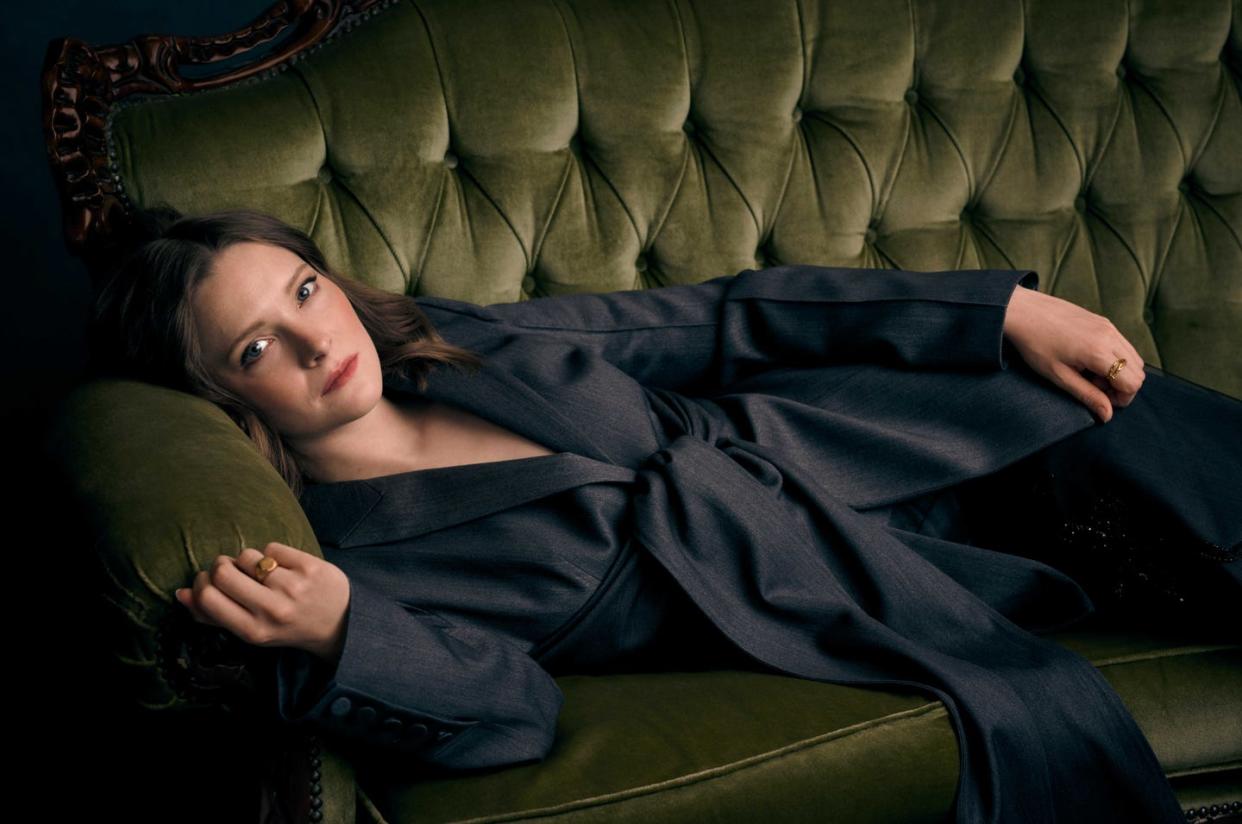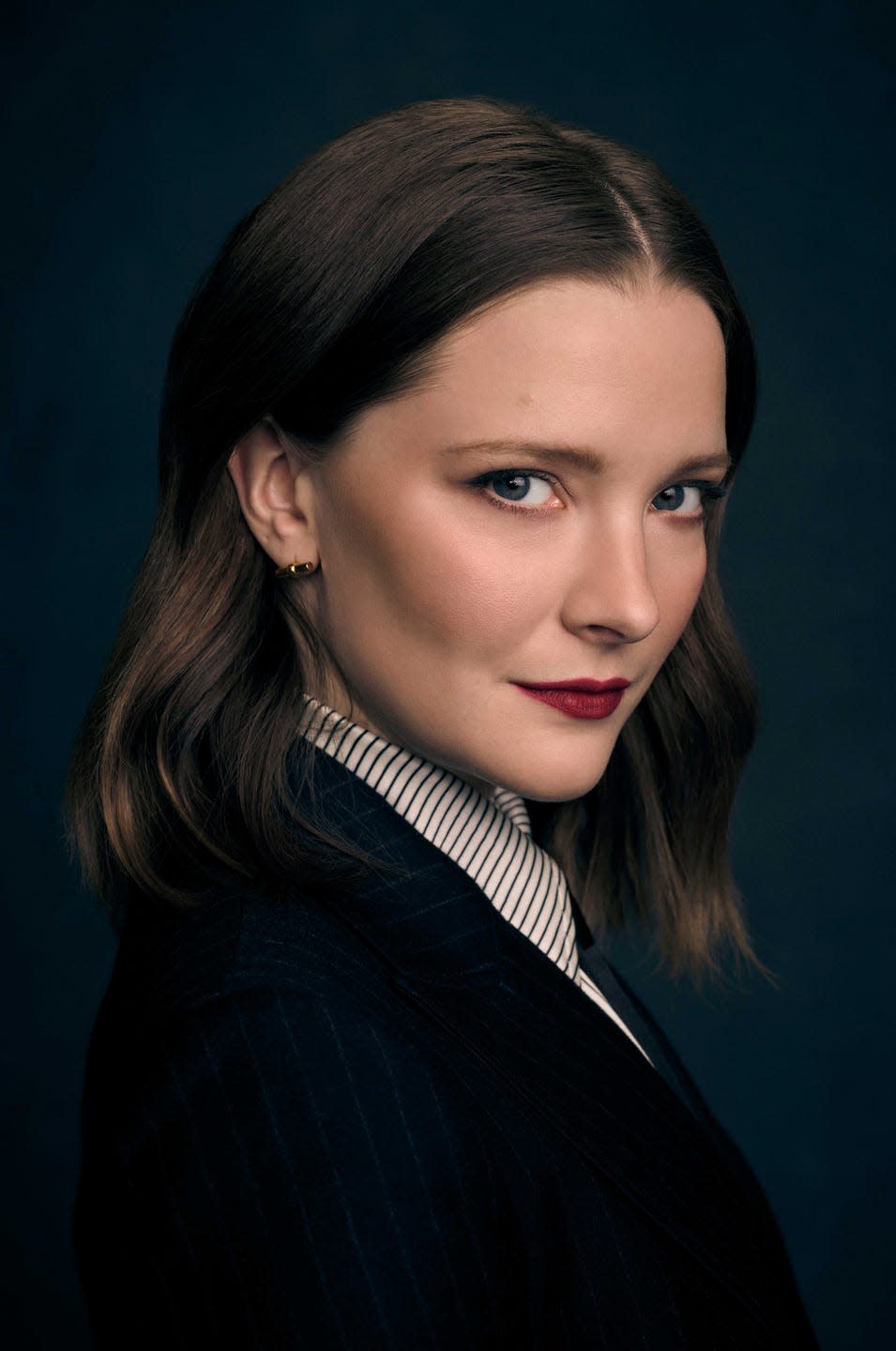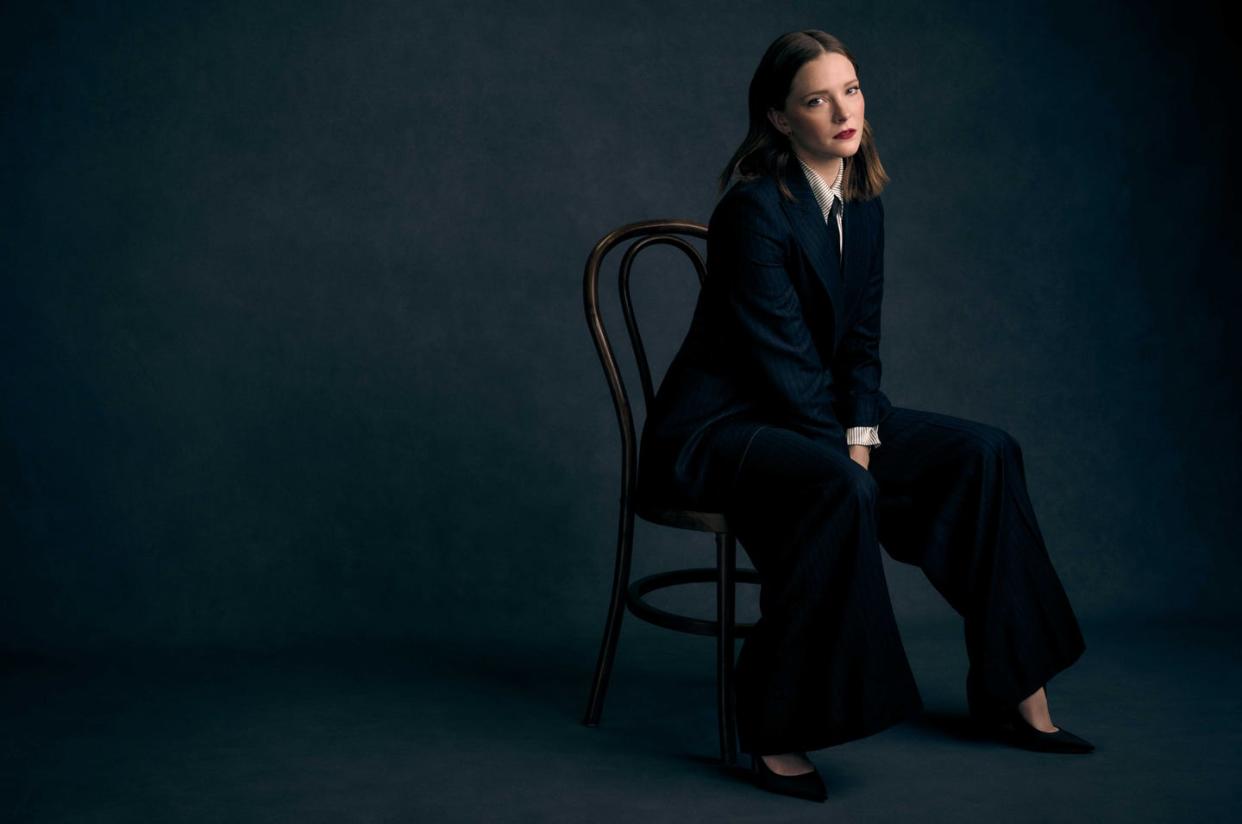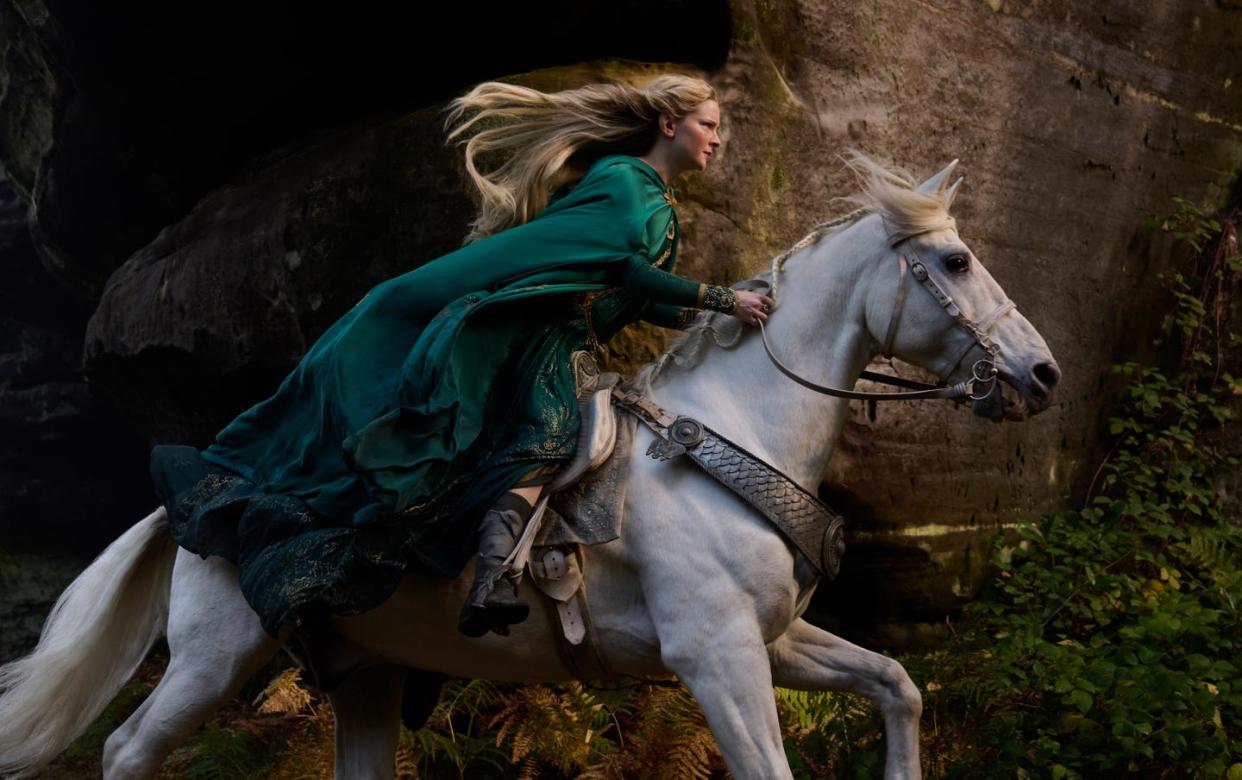Morfydd Clark Responds to 'Rings of Power' Fan Criticism and Teases Season 2

Two years ago, a Reddit user posed an inquiry to the r/LOTR subreddit group, devoted to the never-not-opinionated Lord of the Rings fandom: “Why didn’t they cast someone tall and strong for Galadriel?” This user was referring, of course, to the casting of Morfydd Clark in The Lord of the Rings: The Rings of Power, the massive Prime Video prequel series launched to extraordinary fanfare (and, in some circles, extraordinary derision) in 2022. The Welsh actress Clark—who, stretched to full height, would still need her tiptoes to brush 5’5”—didn’t fit the canonical stature of Galadriel, the elven Lady of the Wood. Played by an ethereal Cate Blanchett in Peter Jackson’s Lord of the Rings film trilogy and described by J.R.R. Tolkien as near 6’4”, Galadriel has long been a ferocious fan-favorite amongst Tolkien devotees—and that included Rings of Power showrunners Patrick McKay and J.D. Payne.
The decision to make Galadriel the lead protagonist of the Rings of Power was a “day one, minute one” choice for the creative team, McKay tells me. Watching Blanchett’s stately Galadriel, they sought to understand, “What if you go back thousands of years before [the Jackson films] and she’s on a battlefield with a sword? That was the first image I remember really grabbing onto and going, ‘Okay, this could be something so distinct and different from, maybe, what people are expecting.’” But subverting fan expectations would be no easy feat, particularly when the actress they selected to do so “completely changed our conception of the character,” McKay says.
Clark—gentle, unimposing, with a naturally sing-song manner of speech—was one of a handful of actresses invited to Los Angeles for an in-person camera test with the Rings crew. There, Clark shuffled into what executive producer Lindsey Weber described as a “poorly lit conference room” and presented her best interpretation of a younger, prouder, lonelier Galadriel. “The second Morfydd spoke, it was over for us,” Weber wrote in an email. “She has a timelessness about her; she seems both young and impossibly wise and self-assured at the same time.” The Saint Maud actress’s diminutive frame made little difference: “She transforms into a person who seems a foot taller.”
It helps, of course, that Clark could naturally mimic the voice of an ancient, fantastical creature. Born in Sweden in the late ’80s but raised in the Welsh town of Penarth, she grew up speaking Welsh, which she describes as “a quite earthy language. You can say things in Welsh that, if you said in English, people would be like, ‘That’s a bit cheesy.’” For Galadriel’s Elvish speech—drawn from Tolkien’s fictional language of Quenya—Clark tapped into the rhythm of her childhood tongue. “I think, in English, I’m a lot more apologetic and smaller,” she tells me when we meet over Zoom. “When I speak Welsh, it feels deeper and more connected.” Speaking as Galadriel, she “tried to bring the connection I have with my voice when I speak Welsh [to] English,” and to “Galadriel speaking Quenya.” The impact is obvious: Weber argues that, when Clark speaks Galadriel’s lines, “it can be like a spell is cast.”
But the zealous praise of her castmates and crew couldn’t protect Clark when The Rings of Power hit Prime Video almost exactly two years ago. Fan reactions were immediate, inescapable, and intense. Audiences review-bombed the series across Rotten Tomatoes and Metacritic. Galadriel—and, by extension, Clark—incited fury for reasons both legitimate and obtuse. Viewers denounced Clark’s appearance for not being lore-accurate; they railed against the character’s “penchant for rage,” arguing she acted like “the worst immature teenager”; they claimed she was “annoying,” “unnecessary fanfiction,” and “a drag”; they decried her lack of behavioral resemblance to Blanchett’s millennia-older version of the elf. Elon Musk took to Twitter to target Galadriel for getting to be the only “brave, smart and nice” character while the male characters are all “coward[s], jerk[s] or both.” (He also claimed, “Tolkien is turning in his grave.”) Others published paragraphs about why Galadriel needed to be seen with her family in order for the show’s timeline to make sense; one writer published a Forbes essay claiming Clark’s Galadriel was an “unlikeable” protagonist who “lacks basic social skills.” These opinions were sometimes articulated thoughtfully, leading to nuanced debates over Tolkien’s text. But all too often, the attacks were little more than misogyny and anti-“wokeness” dressed up as loyalty to source material.
Nor was Clark the only one to endure vitriol: The racist deluge against Rings’ actors of color got so heated that the cast issued a statement across their social media accounts, condemning the “relentless racism, threats, harassment, and abuse some of our castmates of colour are being subjected to on a daily basis.”

“I was just totally unprepared when season 1 came out,” Clark says when I ask about this early reaction period. “I’ve seen a really dark side of what it means to be someone who [anyone] can write a message to on Instagram, and a really lovely side.”
That lovely side—the positive fan interactions—bore Clark through the “negativeness, primarily from men.” She argues that “lots of the criticism I got from some [fans] were for the things making other people feel liberated while watching [Galadriel].” For every viewer who couldn’t stand Galadriel’s all-consuming drive in season 1, there was another who found it thrilling, even empowering. “What certain people didn’t necessarily enjoy about her, other people did,” Clark says. “She takes up space; she’s unapologetic. I didn’t want her to act like a human woman who’s been taught not to be abrasive.”
She continues, “Every other character I’ve played, because they’re human women, there’s shame built in. [In season 1], Galadriel doesn’t have that. I’m glad I committed to that.”
Payne argues this shamelessness made the most sense for the younger Galadriel of Tolkien’s Second Age, still thousands of years from the “wise and magisterial” woman depicted in Jackson’s films, themselves set during the Third Age. In the author’s writing, “Tolkien gives us hints that [Galadriel] was prideful, that she was a warrior at various times in her history,” Payne says. “We said, ‘How can we take her from being an impetuous, prideful young warrior to the wise Lady of the Wood?’”
Adds Weber, Galadriel needed to be what some viewers might call “unlikeable.” In season 1, Clark’s Galadriel befriends the seemingly human Halbrand, played by Clark’s real-life friend Charlie Vickers. In the finale episode, Halbrand reveals his true identity: He is the legendary villain Sauron, whom Galadriel has been intent on destroying from the beginning. Horrified and betrayed, Galadriel realizes it was her own obstinance and thirst for vengeance that set her in her enemy’s trap. Inadvertently, she has helped him return to power. “It’s fun to think about what Galadriel’s ‘unlikable’ decisions led to—would Sauron have found his way to power so quickly if she didn’t help him?” Weber writes. “Or will it turn out, in the end, that she might be able to defeat him one day because she helped him and got to know him in the process? These are the kinds of delightful dramatic questions that come from having an imperfect character.”
As season 2 begins rolling out episodes this week, fans will meet a changed version of Galadriel. She’s stoic, still fierce. But she’s been humbled, and not by audience criticism, but by the nature of the story Payne and McKay planned all along. She’s endured a “massive blow to her pride,” McKay says. “What you see in season 2 is, she’s trying to find her way back into the light.”
Clark puts it this way: “Galadriel had no fellowship in [season 1]; she was an elf alone.” In season 2, “she is accepting that she’s part of something more than herself, and she can’t do this alone. She’s open; she’s painfully open. She’d like to be closed, but she knows she can’t be.”
Galadriel begins season 2 with a difficult task for a human, let alone for an elf: She must admit her own mistake. (Something like: I almost fell in love with my mortal enemy—sorry!) But Clark claims the greater challenge for the Lady of Lórien will be making peace with her own darkness. Sauron sought Galadriel’s companionship for a reason. She has a particular capacity for evil, as demonstrated in a famous scene from The Lord of the Rings: The Fellowship of the Ring, in which Blanchett’s version of the character nearly accepts Frodo Baggins’ offer of the all-powerful One Ring. “All shall love me and despair!” a warped and maniacal portrait of the elf cries—then calms, having “passed the test” of wicked temptation.
In Rings of Power, Sauron shows the younger Galadriel a similar vision: a version of the future in which she rules at his side, having “fully abandoned who she is and gone in with the darkness,” Clark says. But the equally frightening prospect for Galadriel is “that she could become hardened.” In Tolkien’s universe, elves live for so many thousands of years that they must continually fight not to grow jaded with life itself. Clark continues, “She’s fighting against both of those possibilities, which I also relate to. I think we all have to try and maintain our softness, and nurture ourselves to be able to cope with what life throws at us.”

Clark didn’t learn until well into filming season 1 that her friend Vickers, as Halbrand, was playing Sauron’s disguise. Recounting this, Vickers laughs. “I knew from the start of episode 3,” he tells me, “but it’s quite funny she didn’t know.” The actor then hints that, in season 2, part of Sauron’s mission is in response to Galadriel’s rejection of him in the season 1 finale. “There’s a pent-up frustration that sits within him throughout the second season that he couldn’t get her to join him,” Vickers says, “and it probably drives him.”
Rest assured, however: Galadriel and Sauron will meet again before season 2 draws to a close. In each of their interviews, Clark, McKay, Payne, and Weber all tease an approaching reunion between the one-time friends, their shipwrecked meet-cute now doomed to a showdown. (Galadriel “may just surprise you,” Weber foreshadows.)
That showdown seems likely to be complicated by the presence of Nenya, one of the titular Rings of Power forged by elven-smith Celebrimbor and his workers. As fans of the Jackson Rings films might recall, there are 19 of these magical rings: three gifted to the elves, seven to the dwarves, and nine to men. Galadriel is one of the elven recipients; her ring is Nenya, the Ring of Adamant—a suitable name for such a stubborn wearer. As Weber writes, “Galadriel has a fascinating journey with Nenya [in season 2] because she, like the audience, is discovering in real time what it can do…She deeply believes her ring can be a force for good, but she doesn’t know for sure. So the ring becomes a very real symbol of the risks she has taken, of the risks she’s willing to take, to fight for what she believes is right.” She continues, “Nenya changes her, just as the rings change all of Middle-earth. A new power has come into the world, and everyone must reckon with it.”
And the showrunners are eager to take Galadriel in new directions beyond season 2. “Because of the nature of where the story has been so far, it’s been rather grim,” Payne says. Galadriel has had to be “like the Terminator or something. She’s just on a mission. But the character has a lot of other registers and tones that we are excited to play in—some of which you see in season 2, and some of which we’ve already started to think [for] season 3.”

As for Clark the human being, away from Middle-earth, she’s simply “accepting, as of late, that I’m going to spend my life overwhelmed.” Primarily based in London, Clark still spends much of her time in Wales, where she visits friends and family, and has realized that playing an elven queen “doesn’t make the thought of doing a reading at my friend’s wedding any less scary.” In fact, she treasures the fact that—if anything—her experience playing a magical creature has made her own humanity feel all the more precious.
Elves have seen it all, Clark tells me. In Tolkien’s legendarium, they’re living encyclopedias, practically “gods on earth,” having survived centuries only to watch the same sins rinsed and repeated across the eras. “But what’s wonderful about elves is that they don’t become jaded,” Clark says. Instead, “they become more and more convinced that they have to maintain the loveliness of the world, and continue to see goodness. I think that’s quite a nice thing to be reminded of myself, as a mere mortal.”
This conviction—that the ugliness of the world is itself an argument for the necessity of grace—has helped steer her through the harsher reactions to her Rings of Power performance. “I think, ultimately, doing this [show] has made it easier for me to love people,” Clark says. “Fantasy [creates] a childlike openness in people that is amazing to see.”
You Might Also Like
